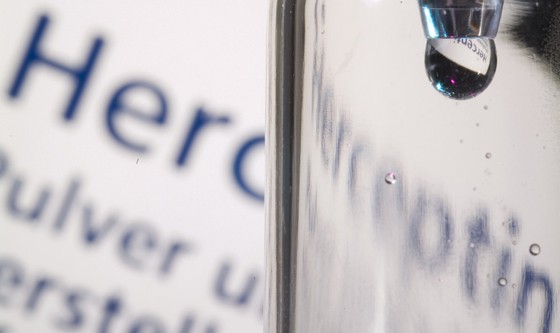
A fixed-dose combination of Roche’s antibody blockbusters Herceptin and Perjeta has cleared a phase 3 trial, promising simpler dosing of the breast cancer drugs – and a defence against biosimilar competition.
The subcutaneous formulation of the two HER2-targeting drugs was equally as effective as giving Herceptin (trastuzumab) and Perjeta (pertuzumab) by intravenous (IV) infusion – the current route of administration – at achieving therapeutic levels in the blood when given alongside chemotherapy.
The results of the FeDeriCa study will now be submitted to regulatory agencies around the world, raising the prospect of a therapy for HER2-positive breast cancer that can be administered as a single injection in just eight minutes, with follow-up doses taking just five minutes.
At the moment, Herceptin and Perjeta therapy requires a 150-minute infusion to provide a loading dose, followed by 60- to 150-minute maintenance doses.
Roche says that this study will have real benefits for patients in terms of reduced clinic time, and of course it could also provide some insulation for its HER2 franchise from lower-cost rivals reaching the market.
Earlier this year Roche gained FDA approval for a subcutaneous formulation of Herceptin – called Herceptin Hylecta – that has a two- to five-minute injection time. It was approved in Europe in 2013, but despite being available for some time it hasn’t been enough to stall Herceptin’s overall decline.
Biosimilar versions of IV Herceptin have really started to take their toll in Europe, carving 45% off sales in the first half of the year and dragging total revenues from the drug down 9% to around $3.2bn, with the declines offset by gains in emerging markets such as China.
IV Herceptin biosimilars from Amgen/Allergan have also been recently launched in the US at a 15% discount to Roche’s list price for the drug.
Roche tried and failed to get an injunction on sales of the biosimilars, and will see at least four others reach the US market in late 2019/early 2020, exposing around 50% of the drug’s sales to competition.
Perjeta meanwhile still has patent protection until 2023 in Europe and 2024 in the US and has been growing quickly thanks to data showing it improves the efficacy of Herceptin when used in combination, and has seen a lot of take-up in adjuvant breast cancer treatment. Sales rose by a third to around $1.8bn in the first six months of 2019.
The new fixed-dose combination will provide an alternative to the use of biosimilar Herceptin plus Perjeta if approved, potentially limiting the impact on Roche’s overall HER2 franchise, and is viewed by some analysts as the key element in Roche’s Herceptin defence strategy.
“With this single injection under the skin, people with HER2-positive breast cancer receiving Perjeta and Herceptin can have a faster treatment option,” said Sandra Horning (pictured below), Roche’s chief medical officer.

Sandra Horning
“Our medicines have helped millions of people living with HER2-positive breast cancer and this latest development is particularly exciting as, for the first time, we have combined two therapeutic antibodies as a single subcutaneous formulation,” she added.




